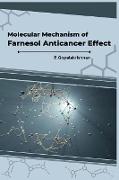Molecular Mechanism of Farnesol Anticancer Effect
BücherAngebote / Angebote:
The molecular mechanism underlying the anticancer effect of farnesol is an area of active research for cancer therapy. Farnesol, a bioactive compound found in various natural products, has shown promising results against hepatocellular carcinoma both in vivo and in vitro studies. The study of its molecular mechanism can provide insights into its therapeutic potential and help in developing targeted therapies.
The anticancer effect of farnesol involves multiple mechanisms, including induction of apoptosis, cell cycle arrest, and regulation of gene expression and signaling pathways. It exhibits cytotoxicity against cancer cells by inhibiting their proliferation and inducing cell death. Farnesol also possesses chemopreventive properties and can inhibit cancer progression, making it a potential candidate for cancer biomarkers.
Further studies have demonstrated that farnesol can modulate mitochondrial function, reactive oxygen species production, and metabolism, which are important factors in cancer progression. It can also regulate the tumor microenvironment and modulate the immune response, making it a promising immunomodulatory agent.
The molecular mechanisms underlying the anticancer effect of farnesol are complex and involve multiple pathways. Understanding these mechanisms can help in the development of novel therapies and the identification of potential drug targets for cancer treatment. Additionally, the synergistic effect of farnesol with other chemotherapeutic agents or radiation therapy has shown promising results in preclinical studies, highlighting its potential for combination therapy in cancer treatment.
Folgt in ca. 15 Arbeitstagen
